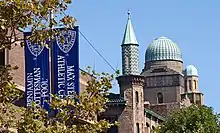Yeshiva College is located in New York City’s Washington Heights neighborhood in Upper Manhattan. It is Yeshiva University’s undergraduate college of liberal arts and sciences for men. (Stern College for Women is Yeshiva College’s counterpart for women.) The architecture reflects a search for a distinctly Jewish style appropriate to American academia.[1]
Roughly 1,100 students from some two dozen countries, including students registered at Syms School of Business, attend Yeshiva College.
On July 27, 2009, it was announced that Barry L. Eichler, Ph.D., would succeed David J. Srolovitz, Ph.D. as dean of Yeshiva College.[2]
Philosophy
Students at Yeshiva College pursue a dual educational program that combines liberal arts and sciences and pre-professional studies with the study of Torah and Jewish heritage, reflecting Yeshiva’s educational philosophy of Torah Umadda, which translates loosely as “Torah and secular knowledge” (the interaction between Judaism and general culture).[3]
Academics
Majors offered include:
- Biochemistry
- Biology
- Chemistry
- Classical languages
- Computer sciences
- Economics
- English
- Finance
- General Business
- Hebrew
- History
- Jewish studies
- Management
- Mathematics
- Music
- Philosophy
- Physics
- Political science
- Pre-engineering
- Psychology
- Sociology
- Speech and drama
Combined and joint programs in business administration, dentistry, engineering, Jewish education, Jewish studies, law, occupational therapy, optometry, podiatric medicine, and social work are also available.
Minors offered include:
- American studies
- Architecture
- Art
- Biology
- Business
- Chemistry
- Classical languages
- Computer sciences
- Economics
- English (Literature and Writing tracks)
- Hebrew
- History
- Jewish studies
- Mathematics
- Music
- Philosophy
- Physics
- Political science
- Psychology
- Public health
- Sociology
- Spanish
- Speech and drama
The Robert M. Beren Department of Jewish Studies unifies and centralizes all academic Jewish studies offerings at Yeshiva College: Bible, Hebrew, Jewish history, Jewish philosophy, and Judaic studies.
In addition to courses leading to the B.A. degree, all students undertake Jewish studies requiring intensive analysis of classic texts in Hebrew and Aramaic. Students are enrolled in a full course of study in one of the following options:
- James Striar School of General Jewish Studies/the Mechinah Program
- Yeshiva Program/Mazer School of Talmudic Studies
- Isaac Breuer College of Hebraic Studies
- Irving I. Stone Beit Midrash Program
Yeshiva College's Jay and Jeanie Schottenstein Honors program stresses writing, critical analysis, cultural enrichment, and individual mentoring.
The S. Daniel Abraham Israel Program allows students who wish to spend a year in Israel to take courses at one of 51 different Israeli institutions.
Student life
Athletics include Maccabees basketball, tennis, fencing, cross-country, golf, soccer, volleyball, wrestling, and baseball. Other student activities include the newspaper The Commentator and the radio station WYUR.

Student government
The student government includes the Yeshiva College Student Association (YCSA), the Yeshiva Student Union (YSU), the Student Organization of Yeshiva and Judaic Studies Programs (SOY/JSC), and the Syms School Of Business Student Association.
Dormitories and student housing
Approximately 90% of the undergraduate student population(s) lives on campus.
The Wilf Campus includes three main dormitory buildings: Morgenstern, Muss, and Rubin Residence Halls. Many upperclassmen live in the surrounding independent housing that is run by the university or in other nearby buildings.
Notable alumni
- Rabbi Chaim Brovender
- Shaye Cohen
- Hillel Furstenberg
- Ari Goldman
- Louis Henkin
- Daniel Kurtzer, former United States Ambassador to Israel and Egypt
- Matthew Levitt
- Nathan Lewin
- Rabbi Albert L. Lewis
- Josef Mandelbaum, CEO of American Greetings
- Chaim Potok
- Rabbi Shlomo Riskin
- Henry Siegman
- Shlomo Sternberg
- Alan E. Willner
- Aaron Klein, author and chief strategist for Prime Minister Benjamin Netanyahu
Notable faculty
Facilities
The campus is centered on the area of Amsterdam Ave and West 185th Street (Yeshiva University's main office is 500 185th St).[4] The buildings in the campus are:
- David H. Zysman Hall
- Sol and Hilda Furst Hall
- Belfer Hall
- Schottenstein Center
- Mendel Gottesman Library
- Max Stern Athletic Building and Benjamin Gottesman Pool
- Ruth and Hyman Muss, Morris and Celia Morgenstern, Joseph and Dora Strenger, and Leah and Joseph Rubin Residence Halls
- Glueck Center for Jewish Studies
See also
References
- ↑ Eitan Kastner, “Yeshiva College and the Pursuit of a Jewish Architecture,” American Jewish History 96 (June 2010), 141–61.
- ↑ Cinnamon, Michael (August 7, 2009). "Dr. Barry L. Eichler Named YC Dean, Outgoing Dean Srolovitz to Assume Position in Singapore". The Commentator. Retrieved 2009-08-07.
- ↑ Marc Lee Raphael (2013). The Columbia History of Jews and Judaism in America. Columbia University Press. p. 310.
- ↑ "Yeshiva University Campus Map" (PDF). Archived from the original (PDF) on 2009-02-05.
Further reading
- Menachem Butler and Zev Nagel, eds., My Yeshiva College: 75 Years of Memories (New York: Yashar Books, 2006) ISBN 1-933143-12-6.
- Victor Geller, Orthodoxy Awakens: The Belkin Era and Yeshiva University (Jerusalem; Urim Publications, 2003) ISBN 965-7108-47-0
- Jeffrey S. Gurock, Men and Women of Yeshiva University: Higher Education, Orthodoxy and American Judaism (New York; Columbia University Press, 1988) ISBN 0-231-06618-X
- Aaron Rakeffet-Rothkoff, Bernard Revel: Builder of American Jewish Orthodoxy (Philadelphia; Jewish Publication Society, 1972) ISBN 0-87306-284-1
- Gilbert Klaperman, The Story of Yeshiva University, the First Jewish University in America (Macmillan, 1969) ISBN 0-684-82341-1
External links
- Official website
- Emporis Standards Committee. "Official World's 50 Tallest High-rise Buildings (Educational Use)"